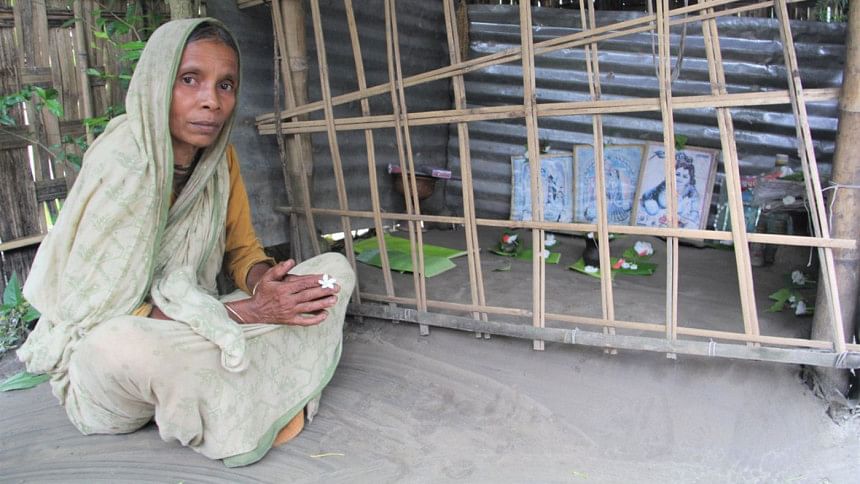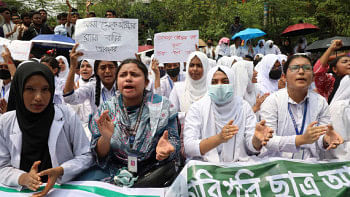We must protect Hindu women’s right to inherit property

In a landmark decision, the High Court has recently ruled that Hindu widows are entitled to inherit shares in all properties of their husbands including agricultural land. Previously, their inheritance rights were limited to homesteads and non-cultivable land only. The decision must have frustrated at least 4 percent of the population of Bangladesh who happen to be Hindu men, including Jyotindranath Mondal who had filed the above case in 1996 seeking a court order to deprive his deceased brother's wife of their father's property. Certainly, Jyotindranath Mondal expected an outcome in his favour and there was every reason for him to do so. After all, Hindu women's inheritance rights in Bangladesh have always been in what can only be termed as an awful mess.
It's quite evident that Hindu legislators and leaders do not want Hindu women to inherit property. The Hindu Women's Right to Property Act 1937, a notorious British-era piece of legislation that the Hindu legislators of Bangladesh have never bothered to revisit, entirely excludes Hindu women from getting a share of their father's or husband's property if there are sons in the family. In the absence of a male heir, only the unmarried daughters and married daughters with sons can inherit property while childless widowed daughters or married daughters without sons do not inherit anything. Those who do inherit properties this way have limited ownership and are not allowed to sell the properties (which the September 2 court ruling also addressed). After their death, the ownership moves to the next male heir of the person they had inherited the property from.
While all reasonable people must find this law discriminatory against Hindu women, Gobinda Chandra Pramanik, a male lawyer and Secretary of the Bangladesh National Hindu Grand Alliance, thinks differently. In an article published on the Union of Catholic Asian News website, he stated, "Most women have accepted the way God has created them compared to men, so they don't care much what is in the laws, because men ensure they are protected and enjoy their due benefits in the family and the society." He added, "I don't think ordinary Hindu women have called for legal changes. Only some so-called women activists and NGOs with vested interests are crying foul over the issue, which surely disrupts the peaceful life of Hindus."
This is a man making assumptions about the experiences of women who will never enjoy any rights over property. A lot of those women often do not have a source of income or any relatives to fall back on and will suffer through the rest of their lives with extreme difficulty after being widowed, or in some cases when they do not have a son. A 2012 Law Commission study finds that 86 percent of Hindu women want their share of their fathers' and husbands' property, but they cannot speak up in fear of stirring up trouble within their families. Therefore, I do believe when Gobinda Chandra Pramanik claims that ordinary Hindu women have not called for legal changes, not because of the reason he cited, but because they are busy trying not to be ostracised by their families and often the whole community.
The plight of Hindu women in Bangladesh can be further attributed to the woeful lack of female Hindu legislators in parliament. Since 2008, the number of male Hindu MPs in the 9th, 10th and 11th parliaments has been 14, 15 and 16 respectively. On the contrary, the number of female Hindu MPs has been 2, 1 and 2 respectively. In 2008, both women were elected in the reserved seats for women, and in the current parliament, one of the two female MPs occupies a reserved seat. At no point have these legislators made the effort to present a new bill to parliament that accords the right of inheritance to Hindu women. If the female MPs are to come up with an updated bill, it would realistically need the support of their male colleagues to counter any backlash. The remarkable silence of the Hindu male legislators on this issue helps safeguard their position within the community that falsely portrays that Hindu women do not want inheritance right.
India was also left with the same 1937 Act by the British but a mere nine years after the independence, they passed the Hindu Succession Act 1956 (later amended in 2005) which granted equal inheritance rights to women, while Bangladeshi Hindu women have been stuck with an 83-year-old law. This is in part because of the fear that if Hindu women who can inherit and own land later marry men belonging to a different religion, the total area of land owned by Hindus in Bangladesh will decrease. In Hindu-majority India, legislators were not bothered by this notion, and consequently enacted laws which equally protect women's interests. So, it seems that by not inheriting lands, Hindu women in Bangladesh are bearing the burden of protecting the cumulative area of land owned by Hindus in the country. This is a predicament that the leaders of the community do not wish to resolve because it also protects their interests.
Whenever the issue of Hindu women's property rights comes up, influential Hindu leaders, who are conveniently male, vehemently oppose it. They worry that if women start owning property, they will feel empowered enough to divorce their husbands. In fact, the lack of ownership of property is often the reason why Hindu women are subjugated and stay in an unhappy or abusive marriage.
Hindu women's right to inheritance is often brushed away as a non-issue because, according to the leaders, in a country where Hindus as a minority barely have any basic rights to begin with, they should not be bothered about gender discrimination within their own community. This is a classic case of using one wrong to justify another one. If the situation of Hindus never improves in Bangladesh, so to speak, then should Hindu women just have to accept their sufferings which are amplified twice over (by religion and by gender) in their own country, simply because they are minorities?
The most ignorant argument of the leaders is that changes to Hindu personal laws will be devastating for Hindu families and traditions. If the tradition they are talking about is "patriarchal entitlement", which does not deem women worthy of owning property unless they give birth to a son, then certainly it will be destructive. They seem to have forgotten that due to the demands of time and to align laws with societal progress, many traditions like Satidaha had to be legally banned too.
Have you noticed that I am literally bringing up Satidaha to speak for women's rights in 2020? If that does not show how cruel the current law is, then I do not know what will.
Anupoma Joyeeta Joyee is a Barrister-at-Law. Email: [email protected]

 For all latest news, follow The Daily Star's Google News channel.
For all latest news, follow The Daily Star's Google News channel. 



Comments